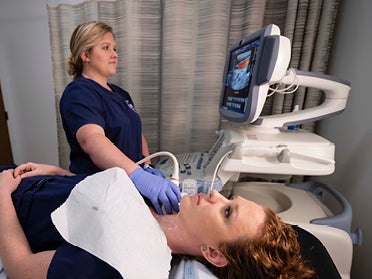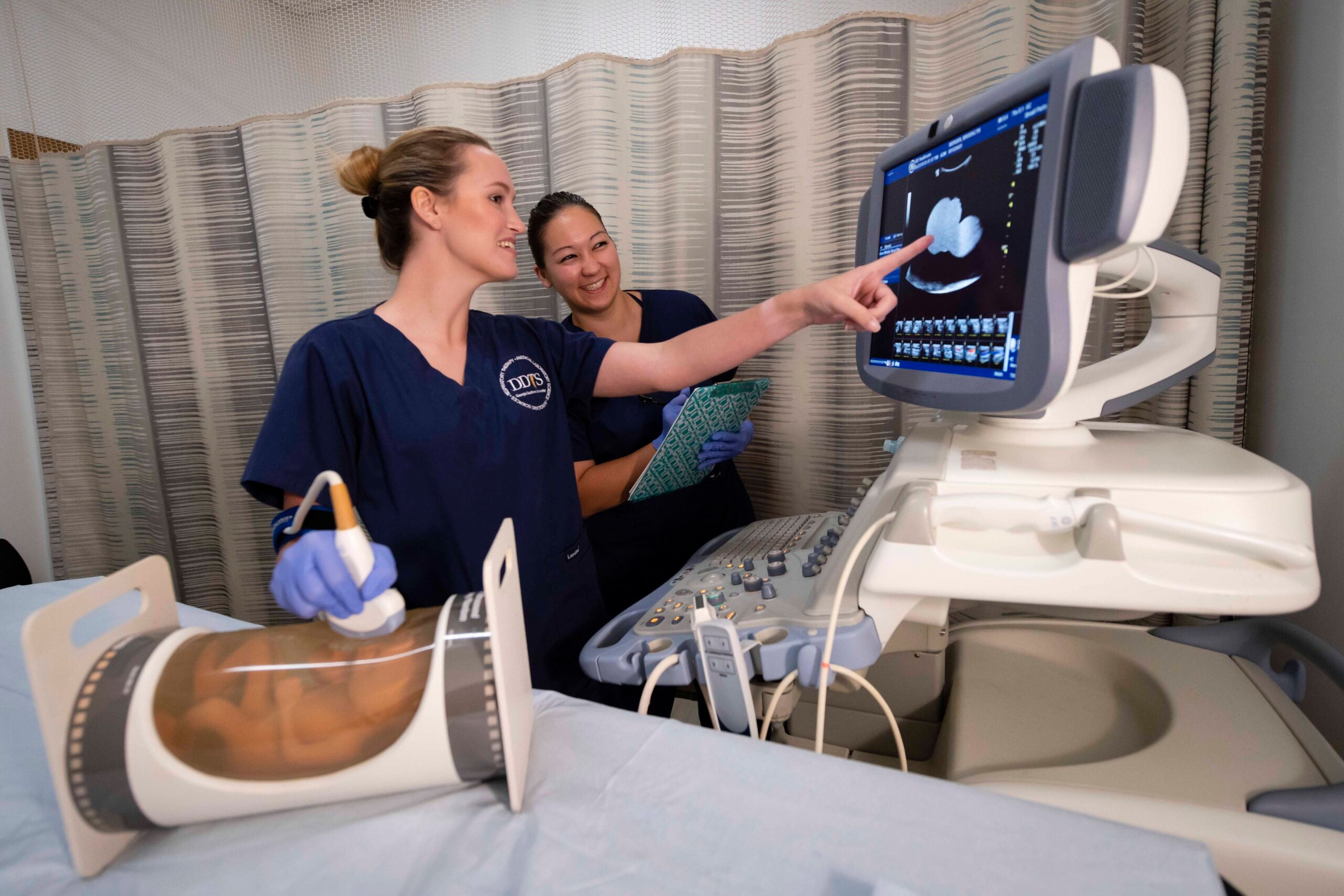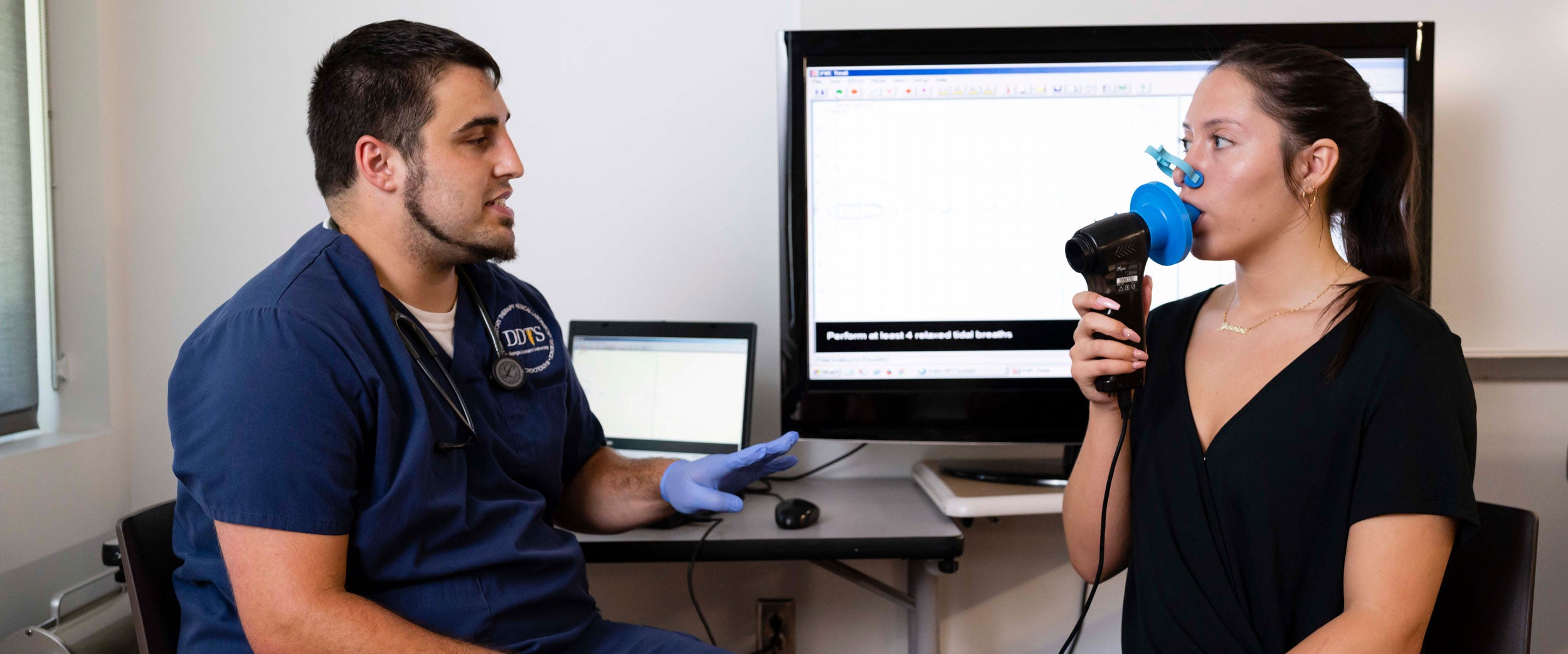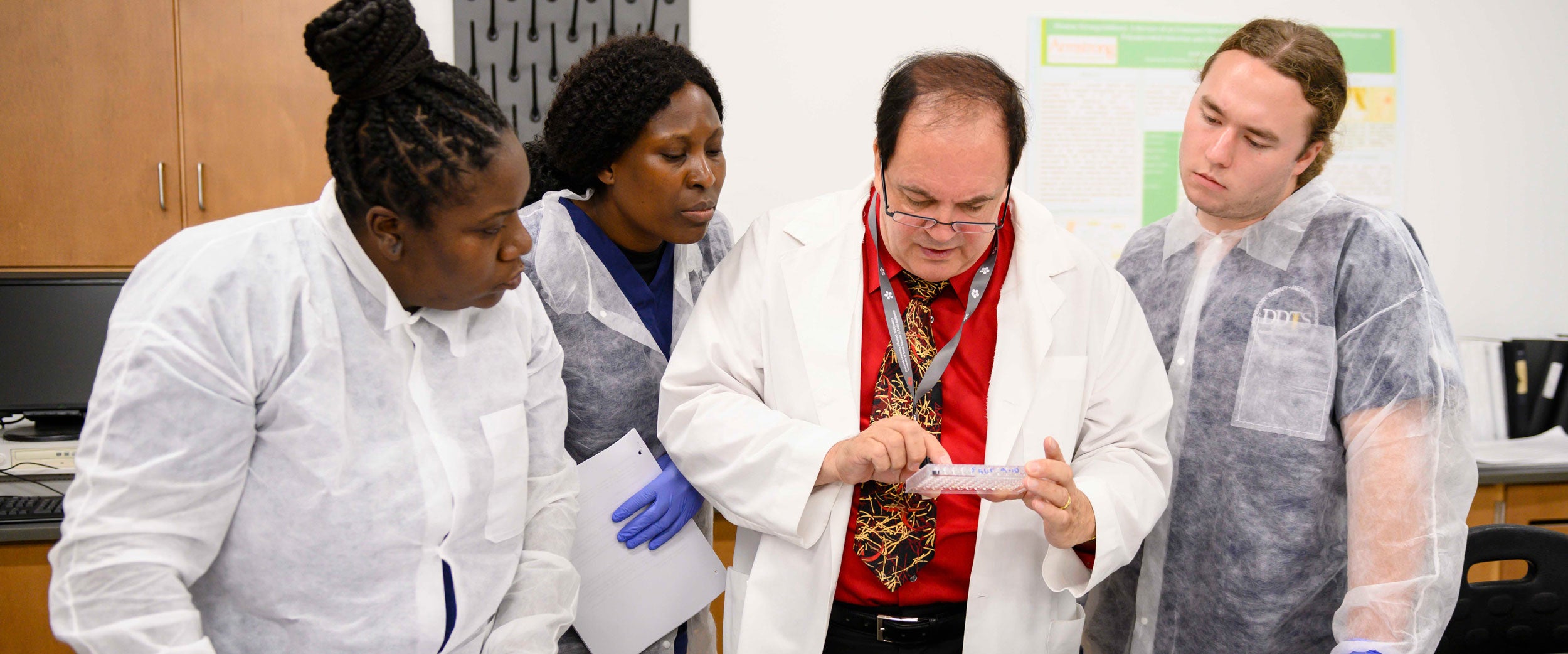Leverage your work experience as a radiographer, radiation therapist, sonographer or nuclear medicine technologist and fast-track your bachelor’s degree to advance your career in care.
Locations
- Online (Full-time and part-time study options)
Why Choose the Radiologic Sciences Bridge Program at Georgia Southern?
- Georgia’s only online degree completion program for radiologic technologists.
- Earn your bachelor’s degree while continuing to work.
- Flexible, affordable online radiology program fits your schedule.
- 130 credit hours to completion.
Radiologic sciences is a field of health care that uses medical imaging technologies to help doctors diagnose and treat diseases and injuries. If you are already working as a certified radiologic sciences professional, our radiologic sciences bridge program offers the flexibility to complete your bachelor’s degree on your timeline and advance your career in health care.
Georgia Southern’s online radiology tech program is ideal for radiographers, radiation therapists, sonography and nuclear medicine technologists—or any professionals already certified by the following credentialing agencies: ARRT (R, T, N, CI), NMTCB (CNMT), CCI (RCIS) or ARDMS (RDMS). You’ll build on your valuable work and patient care experience as you gain the knowledge and skills to complete your degree.
Ready to Apply?
Or, you can:
What Can You Do With a Bachelor’s in Radiologic Sciences?
Radiologic sciences is a diverse discipline in healthcare that combines cutting-edge medical technology with meaningful patient care. Earning your bachelor’s degree will hone your clinical skills, advance your expertise in your field, open doors to leadership roles and build a foundation for further studies.
You’ll be equipped to provide care in a variety of medical settings, from clinics to hospitals, where you may work as a radiographer, nuclear medicine technologist, clinical supervisor, radiology product specialist or radiation therapist. Some graduates choose to continue their education and pursue a master’s or doctorate, or other advanced medical credentials.
Where our graduates work:
- Mayo Clinic
- Kaiser Permanente
- St. Joseph’s
- GE Healthcare
- Atrium Health
- Emory Healthcare
- Children’s Healthcare of Atlanta
- AdventHealth
- Memorial Health
- Wellstar Health System
- Northside Hospital
What our graduates do:
- Diagnostic radiologic technologist
- Sonographer
- Radiation therapist
- MRI technologist
- Clinical program coordinator
- Nuclear medicine technologist
- Mammography technologist
- Cardiovascular technologist
- Clinical applications director
- CT scan technologist
What You’ll Learn
In addition to core curriculum classes, every radiologic sciences student completes courses on research methodologies, leadership and management, advanced radiologic sciences and medical communication skills.
From there, you’ll build your knowledge according to the track you choose. The clinical track features coursework concentrated on advanced clinical skills, such as CT, MRI or mammography, while the non-clinical track explores leadership, management and technical communication.
See the CurriculumChoose Your Track
Georgia Southern’s Radiologic Sciences Bridge program is fully online, offering credentialed professionals two track choices to complete their degree.
Clinical Track
Develop advanced clinical skills, such as CT, MRI or mammography (only available to radiographers). All courses (except clinical education) in the major are offered online, and clinical education may be completed in your local area. Upon completing, you’ll be eligible for certification in CT, MRI or mammography.
Non-Clinical Track
Prepare for leadership or advanced studies with courses that help you strengthen your leadership, management and technical communication skills. All classes in this track are offered online.*
*The non-clinical track of the Bridge program is fully online. The clinical track is composed of didactic classwork, which is fully online, and a clinical education component, which must be completed at an accredited healthcare organization. All clinical education courses can be conducted at sites close to where the students live, however, students who are outside of Savannah will be responsible for identifying potential clinical education sites in their area.
Take Action
Students may apply to the Bridge Program at any time, but you must be admitted to Georgia Southern University before you apply to the Bridge Program.
Admission to Georgia Southern University does not guarantee admission to the concentrations in radiologic sciences. The Department of Clinical Sciences has a separate formal admissions process in addition to the admission process for the University. Applicants must submit a formal application to the program of interest and transcripts of all college and technical school coursework.
Follow these steps to complete the Georgia Southern application:
- Create an application account.
- Complete our online application using the PIN you received after creating your application account.
- Once complete, pay the $30 application fee or upload a valid fee waiver. Previous Georgia Southern applicants and dual enrollment students do not need to pay the fee.
- You can check your application status at My.GeorgiaSouthern.edu/admissions three days after completing your application. This page contains live information about your admission status, including a checklist of missing documents we need to make a decision.
Georgia Southern University is an equal-opportunity education institution and does not discriminate based on sex, race, age, religion, sexual orientation, disability, or national origin in employment, admissions or activities.
After being admitted to Georgia Southern University, complete the Radiologic Sciences Bridge program application.
Apply as a First-Year Student Transfer to Georgia Southern Apply to the Radiologic Sciences Bridge ProgramDegree Requirements
The degree consists of 130 semester hours, 64 hours in the core and 66 hours in the major. You will be given 33 semester hours, 1/2 of the major, for your primary certification.
Options for completing degree requirements at a distance:
- A regionally accredited college or university in your area.
- Online through Southern Regional Education Board
- Online through Georgia eCore
- Most cores are available online at Georgia Southern University. See the course catalog for details.
Admission Requirements
- Graduate of a Joint Review Committee on Education in Radiologic or Nuclear Medicine Technology or Sonography accredited program or equivalent
- Regular admission to Georgia Southern University
- Completion of the radiologic bridge program application
- Grade point average of 2.5 or higher for all college work
- Certification by the ARRT in Radiography, Radiation Therapy, and Nuclear Medicine, or NMTCB in Nuclear Medicine, and ARDMS in sonography (to include SPI, Abd/small parts, and OBGYN) or equivalent for foreign students (if not yet certified, must become certified prior to the end of the first semester at Georgia Southern).
- Before beginning any of the professional courses, the following must be successfully completed: At least 45 semester hours of degree requirements (RT certification applies towards these hours)
- Anatomy and Physiology I and II or equivalent
- Two college English courses and one college algebra course.
Number of students accepted: unlimited (noncompetitive provided admission requirements are met). Students are required to register and complete a virtual SOAR before being advised.
Program Outcomes
Graduates from this program will be able to:
- Evaluate ethical dilemmas in the health care setting
- Function on multidisciplinary teams
- Communicate effectively
- Demonstrate leadership skills
Graduate Outcomes
Graduates from this program are recognized as:
- Collaborative leaders
- Effective communicators (written, oral)
- Technically competent
- Data driven decision-makers
- Successful team members
The Department of Clinical Sciences anticipates that graduates of the Radiologic Bridge program will seek the following professional state licenses or certifications: computed tomography (CT) certificate, magnetic resonance imaging (MRI) certificate, and mammography certificate.
The Department of Clinical Sciences has not determined whether this program satisfies the license requirements for all states and territories for the CT certificate. For required disclosures on whether this program satisfies the license requirements of all states and territories for the CT certificate, click here to check the requirements of your state or territory.
The Department of Clinical Sciences has not determined whether this program satisfies the license requirements for all states and territories for the MRI certificate. For required disclosures on whether this program satisfies the license requirements of all states and territories for MRI certificate, click here to check the requirements of your state or territory.
The Department of Clinical Sciences has not determined whether this program satisfies the license requirements for all states and territories for the mammography certificate. For required disclosures on whether this program satisfies the license requirements of all states and territories for mammography certificate, click here to check the requirements of your state or territory.
State Authorization to provide a program related to the preparation of professionals may not indicate eligibility for certification/licensure in your state. Please consult the appropriate certification/licensure office in your state before enrolling in our program to confirm that your completion of this program will meet your state requirements.
For all Online Programs:
Federal law requires colleges and universities to make certain disclosures to prospective students of these programs. These disclosures include information on the University’s authority to operate outside of Georgia, complaint processes, adverse actions, and refunds. For required disclosures in general with regard to online programs offered by the University, visit the Office of Legal Affairs website.
Many of the clinical programs offered by the Waters College of Health Professions require a clinical internship or practicum experience to fulfill degree requirements. Pursuant to the University’s legal agreements, participants in clinical experiences are required to abide by the workplace rules of the clinical site. Sometimes these rules include vaccination requirements. As always, WCHP will continue to make every effort to place students at clinical sites. However, please be aware that we may be unable to locate a site to accept unvaccinated students, which may cause a delay or inability to progress and complete the program of study.
Related Programs

Take the Next Step
Advance your career in radiologic sciences with Georgia Southern’s online Radiology Bridge program. Ask us how you can turn your experience into an accelerated bachelor’s degree.
Contact Us
Program Coordinator
Shaunell McGee
Phone: 912-344-3203
smcgee@georgiasouthern.edu
Department of Clinical Sciences
Georgia Southern University Armstrong Campus
Department 4902
11935 Abercorn Street
Savannah, GA 31419
Phone: 912-344-2550



